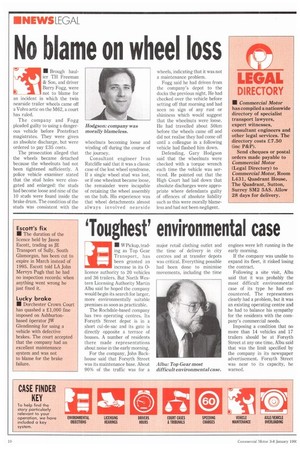No blame on wheel loss
Page 12

If you've noticed an error in this article please click here to report it so we can fix it.
• Brough haulier TH Freeman & Son, and driver Barry Fogg, were not to blame for an incident in which the twin nearside trailer wheels came off a Volvo artic on the M62, a court has ruled.
The company and Fogg pleaded guilty to using a dangerous vehicle before Pontefract magistrates. They were given an absolute discharge, but were ordered to pay £.35 costs.
The prosecution alleged that the wheels became detached because the wheelnuts had not been tightened sufficiently. A police vehicle examiner stated that the stud holes were elongated and enlarged: the studs had become loose and nine of the 10 studs were found inside the brake drum. The condition of the studs was consistent with the wheelnuts becoming loose and winding off during the course of the journey.
Consultant engineer Ivan Ratcliffe said that it was a classic case of the lost wheel syndrome. If a single wheel stud was lost, or if one wheelnut became loose, the remainder were incapable of retaining the wheel assembly on the hub. His experience was that wheel detachments almost always involved nearside wheels, indicating that it was not a maintenance problem.
Fogg said he had driven from the company's depot to the docks the previous night. He had checked over the vehicle before setting off that morning and had seen no sign of any rust or shininess which would suggest that the wheelnuts were loose. He had travelled about 50km before the wheels came off and did not realise they had come off until a colleague in a following vehicle had flashed him down.
Defending, Gary Hodgson said that the wheelnuts were checked with a torque wrench each time the vehicle was serviced. He pointed out that the High Court had laid down that absolute discharges were appropriate where defendants guilty of offences of absolute liability such as this were morally blameless and had not been negligent.
























































